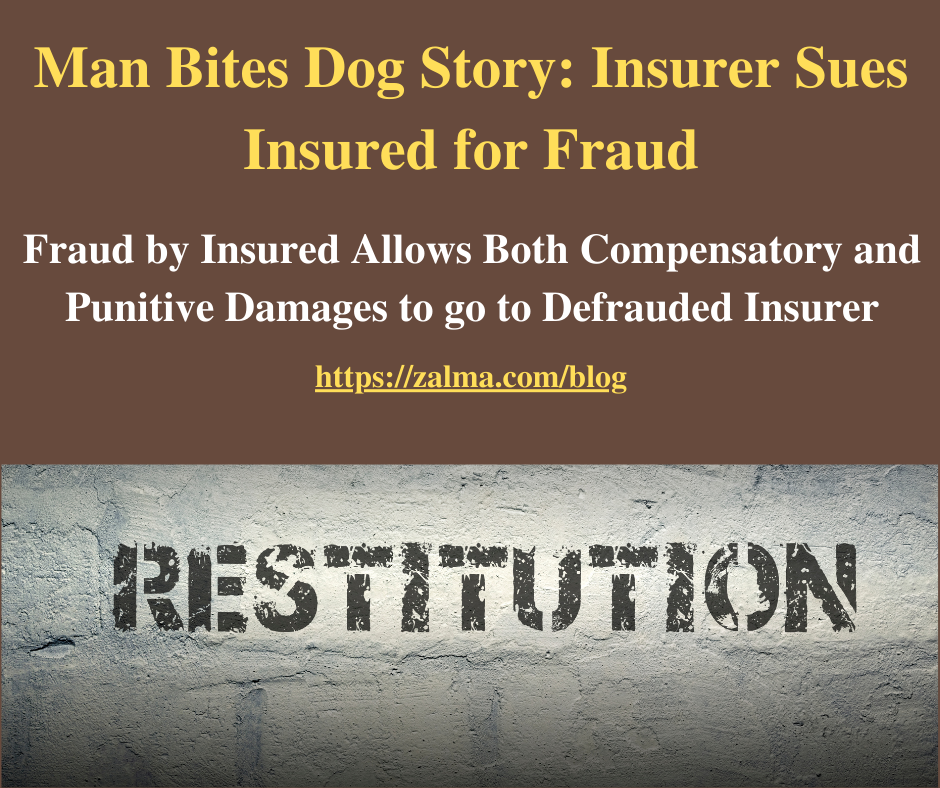Man Bites Dog Story - Insurer Gets Fraud Judgment Against Insured

Fraud by Insured Allows Both Compensatory and Punitive Damages to go to Defrauded Insurer
Read the full article at https://www.linkedin.com/pulse/man-bites-dog-story-insurer-sues-insured-fraud-barry-zalma-esq-cfe and at https://zalma.com/blog plus more than 4100 posts.
Alexander Dallal and Claire Dallal (“the Dallals”) appealed following an adverse jury verdict. The jury awarded Plaintiff-Appellee Lincoln Benefit Life Company (“Lincoln”) $619,290.49 in compensatory damages and $300,000 in punitive damages. In Lincoln Benefit Life Company v. Alexander Dallal, an individual; Claire Dallal, an individual, No. 21-55152, United States Court of Appeals, Ninth Circuit (March 1, 2022).
California law authorizes an award of punitive damages when a plaintiff establishes by clear and convincing evidence the defendant engaged in oppression, fraud, or malice. California generally finds punitive damage awards exceeding 10 percent of the defendant’s net worth excessive.
In this case, a punitive damages analysis under either California law or the Constitution compels the same conclusion-the jury’s punitive damages award should remain undisturbed.
Over the course of nearly a decade, the Dallals systematically defrauded Lincoln out of hundreds of thousands of dollars in insurance benefits by forging documents and having Mr. Dallal feign physical and cognitive incapacity. The jury’s punitive damages award was half of the compensatory award and a fraction of the Dallals’ $4,000,000 stipulated net worth. Insurance fraud is serious misconduct, which could be met with both civil and criminal penalties under California law. Ultimately, after considering the requisite factors, the Ninth Circuit found no basis for disturbing the jury’s punitive damages award under either California law or the Constitution.
The district court concluded that the Dallals’ fraud had irreparably damaged Lincoln’s ability to trust them, and that continuance of the policy would require the expenditure of a disproportionate amount of resources, justifies the use of equitable powers in this case.
ZALMA OPINION
California does not allow an insurer to sue its insured for breach of the covenant of good faith and fair dealing even when as abusive as in this case. However, as this case proves, an insurer may successfully sue an insured for fraud and may obtain both compensatory and punitive damages from its insured. Lincoln should be commended and emulated by any insurer who has evidence that an insured has defrauded it.
© 2022 – Barry Zalma
Subscribe to “Zalma on Insurance” at https://zalmaoninsurance.locals.com/subscribe and “Excellence in Claims Handling” at https://barryzalma.substack.com/welcome.
You can contact Mr. Zalma at https://www.zalma.com, https://www.claimschool.com, [email protected] and [email protected] . Mr. Zalma is the first recipient of the first annual Claims Magazine/ACE Legend Award.

We are 100% funded for October.
Thanks to everyone who helped out. 🥰
Xephula monthly operating expenses for 2024 - Server: $143/month - Backup Software: $6/month - Object Storage: $6/month - SMTP Service: $10/month - Stripe Processing Fees: ~$10/month - Total: $175/month
- Art
- Causes
- Crafts
- Crime
- Dance
- Drinks
- Film
- Finance
- Fitness
- Food
- Spiele
- Gardening
- Health
- Home
- Literature
- Music
- Networking
- Paranormal
- Other
- Politics
- Verzeichnis
- News
- Party
- Science
- Religion
- Shopping
- Sports
- SyFy
- Politically Incorrect
- Philosophy
- Theater
- Technology
- Wellness



